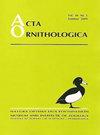蓝山雀卵大小性状的离合器内长期重复性
IF 1.3
4区 生物学
Q3 ORNITHOLOGY
引用次数: 0
摘要
摘要雌鸟在产下相当均匀且个体特定的蛋方面异常一致,因此个体雌鸟的蛋变异较小,而雌性之间的变异较大。重复性是定量遗传学中使用的群体水平参数,用于量化与表型性状(在本例中为卵子性状)的个体间变异相关的个体内一致性水平。重复性的统计测量是离合器中特定卵子性状的组内相关性。本研究基于1999-2003年在波兰中部罗兹市周围的两个生态不同地点(城市公园与成熟落叶林)调查的蓝山雀卵的长度、宽度、体积和形状的重复性的长期数据集。蓝山雀研究群体中卵子长度、宽度、体积和形状的重复性系数在年份和研究地点之间存在一定差异,但通常非常高,平均0.7或更高,并且在几年内各性状之间没有显著差异。观察到的可重复性之间的差异似乎与4月上半月的特定年份天气指标没有密切联系。只有日平均温度的变异系数影响蛋长和蛋宽的重复性,而平均温度的影响不显著。鸡蛋长度在森林中的重复性和宽度在两个地点的重复性随着日温度变化的增加而增加,而鸡蛋长度在城市公园的重复性与温度变化呈相反关系。被认为是繁殖条件的指标的特定年份的平均产卵日期、窝大小和卵子数量往往会对可重复性产生负面影响。然而,总的来说,不同卵子性状的重复性在年份和地点之间的变化并不一致,这表明随机因素在形成这种变化中发挥着重要作用。能够迫使雌性在特定产卵序列中使卵子性状多样化的外部因素似乎不是直接由春季的环境条件造成的,春季对特定年份(4月上半月)的种群产卵至关重要,但似乎与产卵条件变化的更微妙方面有关,如通过与基本育种参数的平均值的链接所示。本文章由计算机程序翻译,如有差异,请以英文原文为准。
Within-Clutch Repeatability of Egg Size Traits in Blue Tits Cyanistes caeruleus in a Long-Term View
Abstract. Female birds are exceptionally consistent in laying rather uniform and individually specific eggs, so that variation in eggs of individual females is low, while variation among females is high. Repeatability is a population-level parameter used in quantitative genetics to quantify the level of intraindividual consistency in relation to interindividual variation in phenotypic traits, in this case, the egg traits. The statistical measure of repeatability is intraclass correlation of particular egg traits clustered in clutches. This study is based on a long-term dataset on repeatabilities of the length, breadth, volume and shape of eggs of Blue Tits Cyanistes caeruleus investigated in two ecologically varying sites (an urban parkland versus a mature deciduous forest) around the city of Łódź, central Poland in 1999–2013. Coefficients of repeatability of egg length, breadth, volume and shape in the study populations of Blue Tits showed some variation between years and study sites, but were generally very high, on average 0.7 or more, and did not significantly differ between the traits within years. The observed differences between repeatabilities do not seem to be strongly associated with year-specific weather indicators for the first half of April. Only coefficients of variation in mean daily temperature influenced repeatabilities of egg length and breadth, whereas effects of mean temperature were non-significant. Repeatability of egg length in the forest and breadth in both sites increased with increasing variation in daily temperature, whereas repeatability of egg length in the urban park site showed a reverse relation with variation in temperature. Year-site-specific mean laying dates, clutch sizes and egg volumes, considered as indicators of breeding conditions, tended to negatively affect the repeatabilities. However, in general, repeatabilities of different egg traits were not consistent in their variation between years and sites, which suggests an important role of stochastic factors in shaping this variation. External factors that are able to force females to diversify traits of eggs in a particular laying sequence do not seem to directly result from the environmental conditions prevailing during a spring period critical for laying eggs in a population in a given year (the first half of April), but seem to be linked to more subtle aspects of variation in the conditions for egg laying, as shown by links with the mean values of basic breeding parameters.
求助全文
通过发布文献求助,成功后即可免费获取论文全文。
去求助
来源期刊

Acta Ornithologica
生物-鸟类学
CiteScore
2.10
自引率
0.00%
发文量
14
审稿时长
>12 weeks
期刊介绍:
Publishes scientific papers (original research reports, reviews, short notes, etc.) and announcements from all fields of ornithology. All manuscripts are peer-reviewed.
Established in 1933 as Acta Ornithologica Musei Zoologici Polonici, since 1953 continued under the present title.
Published twice a year by the Natura Optima Dux Foundation under the auspices of the Museum and Institute of Zoology, Polish Academy of Sciences.
 求助内容:
求助内容: 应助结果提醒方式:
应助结果提醒方式:


